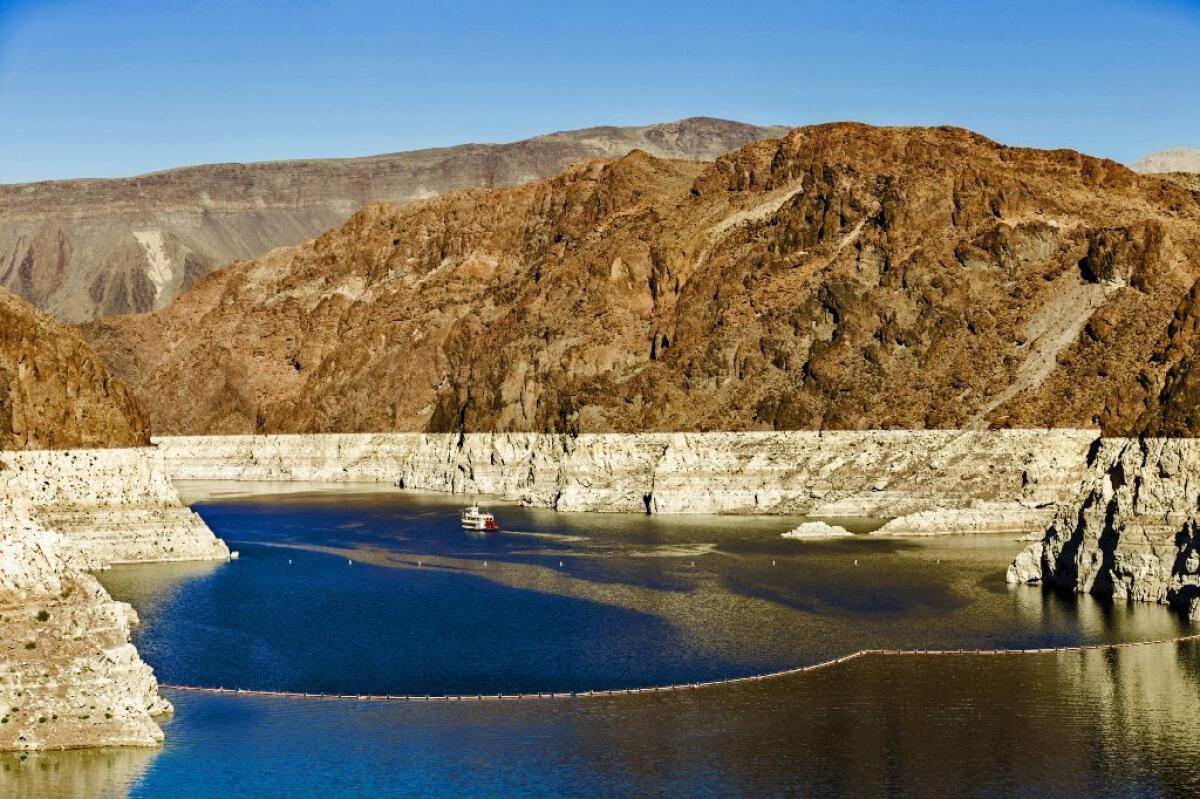Conservation efforts rush to beat a deadline: Inauguration Day

- Share via
The West’s most powerful water managers held an emergency conference call on the morning before Thanksgiving to consider the same question people across the country are asking: What will the election of Donald Trump mean for the issues they care about?
The group desperately wants to formalize new measures that will reduce how much water Southwestern states take from the Colorado River and ease pressure on the nation’s largest reservoir, the drought-stricken, rapidly shrinking Lake Mead. The water managers want to get it done while the federal officials they have been working with for years, many of whom are political appointees, still have their jobs.
“What we’re driven by is not ideology or what can or should be done by the Obama administration versus what the Trump administration might do,” said Ted Cooke, the general manager for the Central Arizona Project, one of the West’s largest water agencies. Cooke participated in the call along with Mike Connor, the deputy secretary of the Interior; Estevan Lopez, the head of the Bureau of Reclamation; plus state and local officials, including from California.
“It’s just the uncertainty and inertia that exists in any change of administration,” Cooke said. “I’m sure their replacements will be capable, qualified and competent people, but even the best people need some time to get up to speed. In the meantime, Lake Mead is going glug, glug, glug. So we reaffirmed our commitment to getting this done, if humanly possible, by Jan. 20.”
That, of course, is Inauguration Day, but it has increasingly come to seem like the edge of a steep cliff for some advocates who want to protect land and water in the West. While water managers may be driven by practical concerns, advocates involved in other environmental issues worry about politics, and they, too, are acting with urgency in hopes of seeing their priorities approved in the final two months of the Obama administration.
Conservation groups are pressing to finalize a range of rules that would, for example, limit where oil and gas can be developed near Arches and Canyonlands national parks in southern Utah, and where roads can be built in national forests in Colorado. Some want President Obama to designate vast and controversial new national monuments near the Grand Canyon and in the Bears Ears section of Utah that is home to Native American tribes and sacred sites.
“These actions would represent significant, longstanding and positive change in the Rocky Mountain/Colorado Plateau region and would inure to the benefit of all Americans who cherish their public lands,” Heidi McIntosh, managing partner in the Denver office of the environmental law firm Earthjustice, wrote in response to an email query.
The Obama administration has already taken a striking number of actions just since election day, including finalizing a rule to reduce methane emissions from energy production, a plan to prevent oil and gas development on Montana land that is important to the Blackfeet tribe, a move to curb gold exploration near Yellowstone National Park and a ban on offshore drilling in the Arctic for five years.
These moves were all in the works long before Trump’s stunning victory, but they have added to the sense that a clock is ticking toward an unknown future. Obama faced plenty of criticism from environmental groups during his two terms, but his record appears extraordinarily green in the context of Trump’s vows to cut back environmental regulations and open more public lands to energy development.
On the campaign trail, Trump regularly questioned climate science and said he would pull the United States out of the Paris accord for reducing emissions that cause climate change. This week, he appeared to hedge, saying in an interview with the New York Times that there is “some connectivity” between human activity and climate change and that he is “open-minded” on the Paris accord.
Then again, in a video Trump released on Monday, he said that one of his first acts in office will be to “cancel job-killing restrictions on the production of American energy, including shale energy and clean coal, creating many millions of high-paying jobs.”
He also said that for every new regulation created under his administration, two would have to be eliminated — a promise that struck many as arbitrary. Ken Kimmell, the president of the Union of Concerned Scientists called the idea “absurd” and “illegal” and said it “shows a lack of understanding of how regulations are issued.”
Trump cannot reverse the designation of national monuments. The authority to name them is given to the president by Congress through the Antiquities Act and presidents have used it for more than a century.
Yet, Trump, along with the Republican-controlled House and Senate, would have enormous power to undo many environmental regulations approved under the Obama administration, either by taking executive action or by going through the lengthier federal rule-making process.
Thomas McGarity, a professor at the University of Texas School of Law who focuses on environmental and administrative law, speculated that the new methane rule, which was strongly opposed by the energy industry, was among those that could be undone through the little-used Congressional Review Act, which gives Congress the power to more easily do away with certain federal rules not long after they are made.
The Congressional Review Act has only been used once, to undo a rule involving ergonomics and worker health that was passed in 2000 at the end of the Clinton administration. As the Congressional Research Service noted in a report last week, the act is more likely to be used when there is “turnover in party control of the White House, particularly a turnover in which the incoming president shares a party affiliation with a majority in both houses of Congress.”
That will be the new reality on Inauguration Day.
“We got the trifecta this time,” McGarity said.
Kristen Brengel, the vice president for government affairs for the National Parks Conservation Assn., said an emboldened Congress is what concerns her most. While President Obama has been in office, Republican lawmakers have faced a veto threat if they tried to push through ambitious measures to reduce environmental regulations and protections.
Brengel’s group and others have identified more than 150 pieces of pending Republican-backed legislation that, if passed, could undercut programs to restore wildlife populations, make it easier for livestock to graze on public lands and allow more logging of old-growth trees in Alaska’s Tongass National Forest.
Other legislation would remove protections for at-risk species, create loopholes for climate emissions, remove funding for stream protection near coal mines and allow more aggressive tactics for hunting bears, to name just a few.
“President Trump wouldn’t have to think a lot about it,” Brengel said. “He could just sign off on the bills. Just like that.”
The forecast for Lake Mead: Hot and dry with plenty of anxiety
Obama administration bans Arctic offshore oil drilling through 2022. But will Trump reverse it?
How’s how the Obama administration proposes to reduce greenhouse gases
More to Read
Sign up for Essential California
The most important California stories and recommendations in your inbox every morning.
You may occasionally receive promotional content from the Los Angeles Times.











